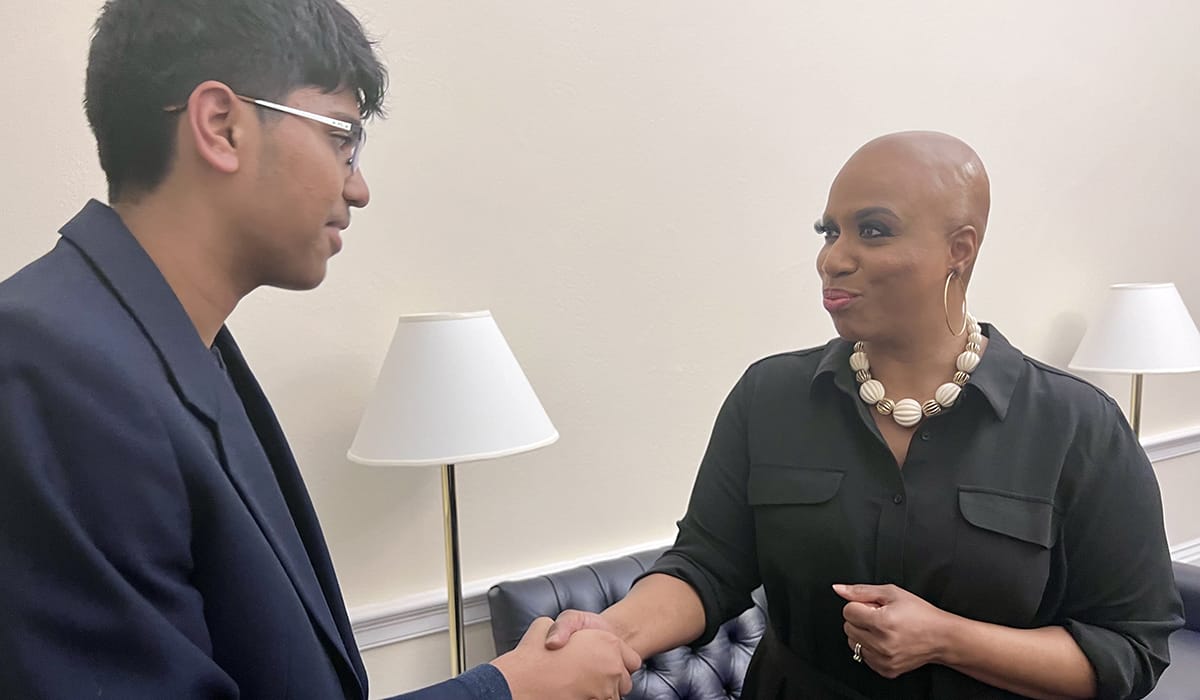Massachusetts Teen Advocates for Public Bathroom Accessibility

Meet Daily Point of Light Award honoree Amith Saligrama. Read his story, and nominate an outstanding volunteer or family as a Daily Point of Light.
Seventeen-year-old Amith Saligrama and his grandfather used to regularly go on walks together, but one day, his grandfather stopped. The joy he felt while exercising turned to anxiety when he was diagnosed with a condition that made bathroom stops necessary and was unable to locate facilities along his routes.
“That really hurt me, because I knew how much he loved walking, especially with me and my family,” Amith recalls.
After struggling to find information on municipal websites and realizing that apps designed for the purpose of locating bathrooms weren’t updated or included private facilities, Amith dug deeper.
“I did a lot of surveys and found horrific stories of, for example, racial minorities getting arrested for using retail restrooms and taxi drivers having to use wide mouth bottles to relieve themselves,” he says. “It became very clear to me that nobody really had a solution to this issue yet.”
It was then that he decided to use his coding skills to create bathroomaccess.com, an interactive map of all the public restrooms in the greater Boston area. For the last four years, Amith has been tracking down vital information like stall numbers, hours of operation, wheelchair accessibility, etc. for more than 400 locations. He leaves private restrooms off the map, citing that they might charge for entry or require you to be a customer. There are other unfortunate barriers involved as well.
“You also need to kind of look a certain way; an unhoused person, for instance, might not easily be able to walk into a hotel to use the bathroom,” he explains.

Grecia White, a former reporter and current mobility planner for the City of Boston, preaches the importance of public restrooms for mobility. She cites the complications of a simple trip across town with kids as an example where better infrastructure could lead to peace of mind.
“As a planner, it’s something I definitely think about. I was lucky enough to be able to go to Vienna earlier this year, and they have a pretty robust network of public restrooms,” she notes. “I think there’s a lot to learn from other countries, and it’s something I hope to be able to incorporate into my work, even if it’s just adding wayfinding information.”
Curating a list hasn’t been an easy process. While Boston itself has a list of public bathrooms, the 40+ municipalities surrounding it with over 5M+ residents and even more visitors do not. An average resident will work in one area, live in another and visit friends in yet another. The status quo wasn’t enough.
Town halls and public libraries are almost guaranteed to have bathrooms for anyone to use, so Amith starts there. Then, he makes a list of parks and public buildings and starts calling. He also contacts city officials.
“Not everyone keeps a list, but when they do, I’ll ask them to list the information on their municipal website. They’re sometimes hesitant to do so, fearing it will attract undesirable activity like drug use or misuse by the unhoused population, but I’ve had success with three so far,” he offers.
Grecia emphasizes what a momentous accomplishment getting the list posted on a municipal website is.
“With government work, things take time. And if you think about building out a network of public restrooms, that takes a lot of money and a lot of political will,” she adds.
Amith considers lack of access to public restrooms a dignity and fairness issue, and as part of his two-pronged approach to tackling the problem, focuses on advocacy as well as building out his resource. He hopes to get cities to acknowledge the issue, make a list available and build more restrooms to meet the need. Today, more than 1,000 people use his map every day. It has been added to websites like the New England Crohn’s and Colitis Foundation, Massachusetts Department of Health and Social Services and Massachusetts Independent Drivers’ Guild.
Amith has also spoken at town halls and authored op-eds to raise awareness about lack of adequate public facilities. In fact, his advocacy work has earned him a spot as the youngest board member in the history of the American Restroom Association (ARA). It has led him to the US Capitol as well as the office of Massachusetts State Assistant Majority Leader Alice Peisch’s office where he’s helping draft a bill that would increase access to public bathrooms statewide. It was his trip to DC after winning the Congressional App Challenge informed his approach to the latter.
“In my meeting with [Congresswoman Ayanna Pressley], she gave me pointers on how to talk about this as an information justice issue and how to convince lawmakers to help,” he says. “That helped me a lot with my work with State Representative Peisch.”
Words matter, and Grecia cites Amith’s approach to communication one of the reasons for his success.
“Sometimes when talking to him, I would forget that, at the time, he was only 16. He’s able to speak about these issues in a way that most people that I have worked with are not able to really articulate,” she says. “He’s very effective in his messaging.”
In addition to using his website to bring attention to an unlisted bathroom, users routinely express gratitude. One man on the verge of retirement uses the map to plan his walks and noted his appreciation for the assistance staying active as he gets older.
“I really appreciated that, because it reminded me of my grandfather,” Amith recalls. “I’ve helped someone keep walking because of the map. That’s what I set out to do.”
The initiative to solve a problem that affected someone he loves led Amith to help thousands, both in his community and beyond. His dedication to meeting a basic human need and recognizing the indignity of society failing to do so shows a level empathy beyond his years.
Amith hopes to take what he’s learned through his experiences and explore urban studies in college. In the meantime, he urges people to call their state representatives, volunteer for an ARA initiative or even start a bathroom list of their own.
“Everyone recognizes problems, but not many people try to fix them. And that’s what I want to impress upon people. There are small things that we can all do to help others,” he states. “Be open and understanding of other people’s situations.”
Do you want to make a difference in your community like Amith? Find local volunteer opportunities.
